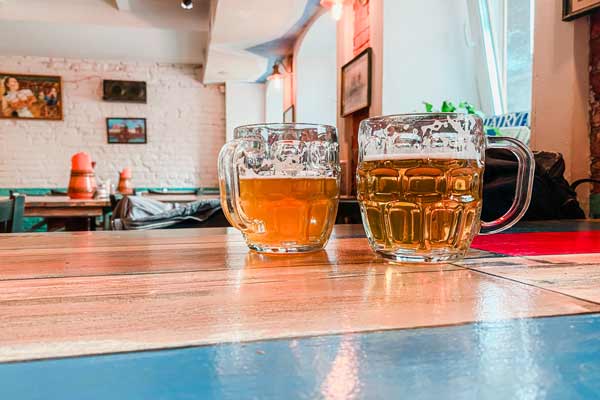Most of us try to live a healthy lifestyle with diet and exercise but sometimes fun times can add to a lot of unhealthy choices in the moment; such as appetizers and drinks. So it’s hard seeing the benefits of a healthy diet and exercise when we’re always going out for some drinks with friends. Besides the food, beer is filling and full of carbs and mixed drinks are usually filled with sugar. Is there a healthy way to drink? What is healthier when it comes down to two choices: beer or hard liquor?
Is There a Healthy Choice of Alcohol?
First of all, the healthiest choice is to not drink at all but sometimes that doesn’t happen. Also even if we are trying to drink “healthy”, too much of a good thing, even “healthier” alcohol, can land you in the hospital with alcohol poisoning, and that would be the least of your worries. The Centers for Disease Control and Prevention defines a single serving of beer or wine cooler as 12 oz.; malt liquor as 8 oz.; wine as 5 oz.; and 80 proof alcohol — the standard — as 1.5 oz. A woman who drinks more than once a day or a man who drinks more than two a day is considered to be a heavy drinker. And finally, women who drink more than four drinks, or men who drink more than five drinks within a couple of hours, are considered to be binge drinkers.
The Beer vs. Hard Liquor Debate
Moderate alcohol consumption, according to the Dietary Guideline, can help reduce your risk of heart disease, reduce the risk of stroke, and lower the risk of gall stones. However, many people cannot drink moderately and may fall into patterns of binge drinking or worse: alcoholism. Getting help for alcohol dependence is important because being addicted to alcohol can kill you. Alcohol withdrawal symptoms alone are enough to put someone through hell. More About Beer The calories in a 12-fluid ounce bottle of regular beer vary from around 150 to 300. Lighter varieties usually run around 100 calories for 12-fluid ounces and are sold in bars, restaurants, and grocery stores. However many bars offer pints which are 16-fluid ounces with around 200 to 400 calories each. But if you’re looking for nutritional goodness, dark beer is the way to go. A study finds that dark beers have more iron than both pale and non-alcoholic beer. More About Liquor Liquor or spirits is vodka, gin, rum, tequila, and other “hard” alcohol. 1 – 1.5 fluid ounces will be about 100 calories depending on proof. And usually, liquor is accompanied by other mixers that add a lot of sugar and that’s where calories can get out of control. When liquor is combined with sugary mixers and regular soda or juice, they can run up to and above 500 calories each. And oftentimes, they contain more than one or two servings of liquor. It’s also easier to over-pour one serving unless you use something to measure the liquor with. So when it comes down to it beer is the healthier option because it’s just easier to control calories. Unless you enjoy liquor mixed with a non-calorie beverage like seltzer or over ice. it’s just too easy to go overboard in those mixed cocktails. Also what can tend to slow down the consumption of empty calories is eating beforehand and drinking water in between drinks. This can help you from drinking too much and drinking too many unwanted calories. Of course, the best option is to not drink at all cause nobody is perfect and every person takes the risk of abusing alcohol.
Recovery from Chronic Alcoholism
If you or a loved one has an alcohol abuse problem Evoke Wellness at Cohasset can help. Evoke Wellness at Cohasset provides men, women, and families with comprehensive, integrated care, geared towards setting a solid and lasting foundation for lifelong recovery from substance use disorders. We are fully accredited by the Joint Commission, which shows our dedication to offering the highest quality of addiction care for each person that steps through our doors. Call today!




